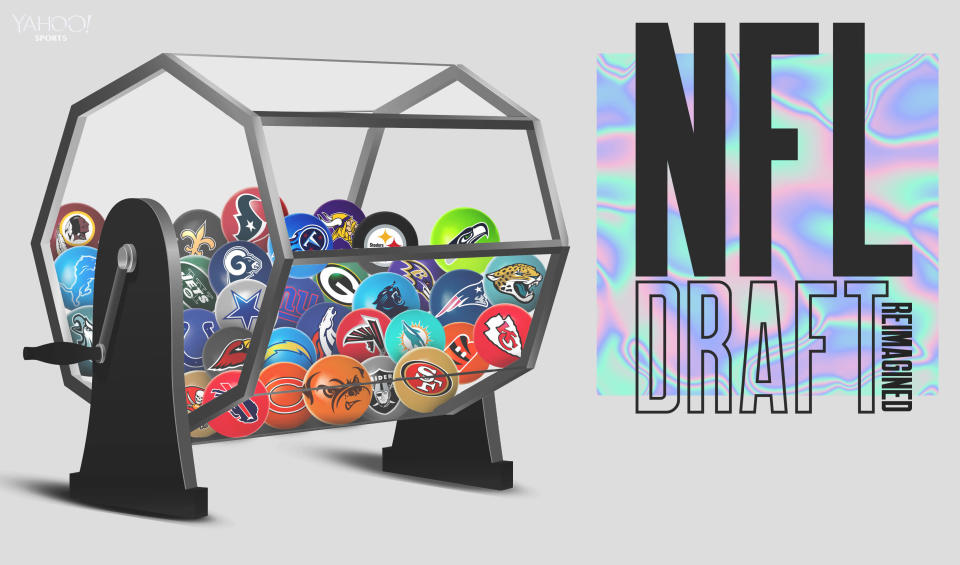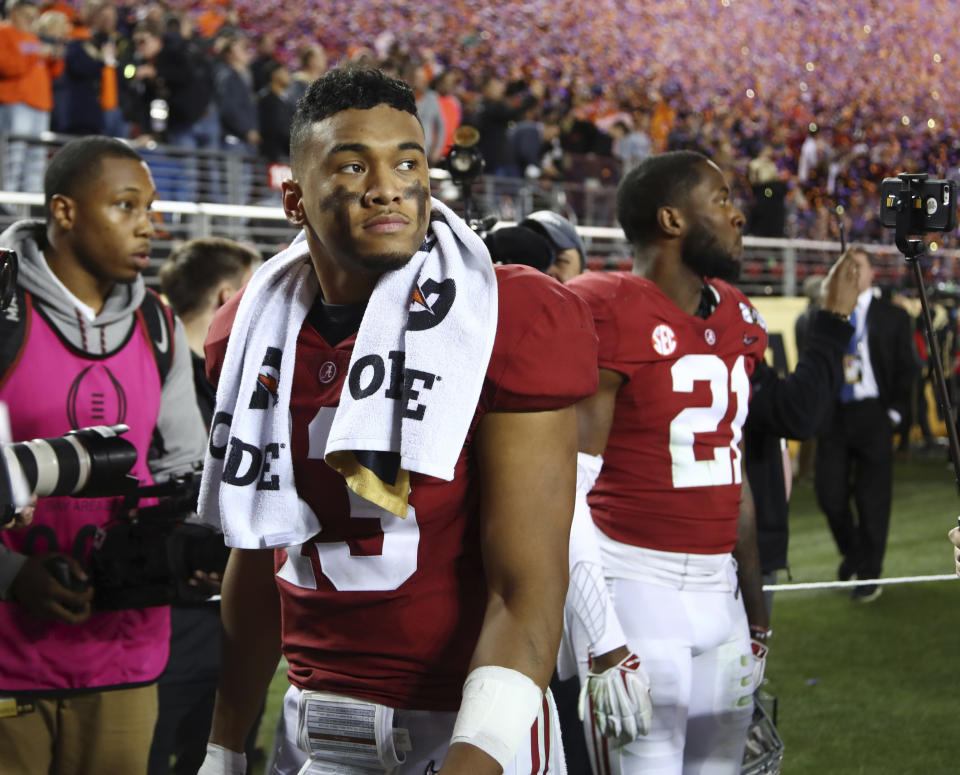Here’s a fantasy glimpse of what a 2020 NFL draft lottery could look like

Come with me to an alternate reality. It’s Feb. 11, 2020, and just a week earlier, Patrick Mahomes led the Kansas City Chiefs to their first Super Bowl title in 50 years after becoming the only quarterback in NFL history to throw for 65 touchdowns in the regular season.
(Given the reigning MVP’s inherent greatness, this might be the most realistic thing in this entire column.)
Yet, the Chiefs’ championship run is not going to go down as the most historic thing to happen in the NFL this calendar year. The league, in keeping with its goal of making its product a 365-day deal while grabbing as much cash as possible, is set to host its first NFL draft lottery.
It all came together quickly, you see. The NFL’s team owners, long turned off by the lottery idea, suddenly and unexpectedly decided to implement one of their own during the May 2019 owners meeting. Only a week prior, they’d taken note of the intrigue and fan interest created by the NBA’s lottery, which drew a 3.9 overnight rating — roughly equivalent to the first night of the 2019 NFL draft on ABC — as people tuned in en masse to see where that league’s next generational superstar, Duke’s Zion Williamson (who looks like Dominique Wilkins in Larry Johnson’s body), would end up. The NFL has never been one to pass up a chance to drive additional revenue.
The primary reason the NBA has a lottery is because the pro hoops league has a pronounced tanking problem, where paying fans are often forced to watch teams throw away wide swaths of the season in hopes of landing a generational superstar. The NFL didn’t have that issue because unlike the NBA — which plays a laborious 82-game season — NFL teams and their fans treat all 16 of their games like life and death. And from an employment standpoint, they basically are. That’s why, when I recently broached the possibility of implementing the lottery with one league spokesman recently, he started chuckling like an amused parent before spending seven minutes explaining why it’s never been discussed and why it will likely never happen. “It hasn’t been contemplated by the league — I can’t recall a time where it was,” the spokesman said. “[It’s] highly unlikely [because of] the competition on the field, the desire of players to put their best foot forward and also the coaches’ desire to win.” OK then!
Yet, in this column’s alternate universe, here’s a better chance for teams to land a generational quarterback in a pass-reliant league while curtailing the possibility of an NBA-ish Tankapalooza that surely would make commissioner Roger “Protect the Shield” Goodell frown.

And given the tight timeline — with Alabama’s Tua Tagovailoa and Oregon’s Justin Herbert coming down the pike within 12 months — in this scenario, the league just decides to hijack the NBA’s system, which was recently tweaked to disincentivize tanking by a.) improving the lottery odds for non-playoff teams that finished in the middle of the lottery order and b.) determining the first four picks by the lottery instead of just the first three.
Those tweaks actually contributed to the New Orleans Pelicans, Memphis Grizzlies and Los Angeles Lakers all leapfrogging worse teams to land a selection in the top four. So to see what would happen in our alternate universe, I used CG Technology’s projected win totals for the 2019 NFL season and gave the bottom 14 teams the same lottery odds the NBA’s bottom 14 would get, which looked like this:
Miami Dolphins — 4-12 (14%)
Cincinnati Bengals — 5-11 (14%)
Arizona Cardinals — 5-11 (14%)
New York Giants — 5-11 (12.5%)
Oakland Raiders — 6-10 (10.5%)
Detroit Lions — 6-10 (9%)
Washington Redskins — 6-10 (6%)
Tampa Bay Buccaneers — 6-10 (6%)
Denver Broncos — 6-10 (6%)
Buffalo Bills — 6-10 (3%)
Carolina Panthers — 7-9 (2%)
San Francisco 49ers — 7-9 (1%)
New York Jets — 7-9 (1%)
Tennessee Titans — 8-8 (1%)
I then entered those teams and their odds on draftpicklottery.com, which spat out the following results:
14. Tennessee
13. New York Jets
12. San Francisco
11. Carolina
10. Buffalo
9. Tampa Bay
8. Washington
7. Detroit
6. Arizona
5. Cincinnati
4. Denver Broncos
3. Oakland/Las Vegas
2. New York Giants
1. Miami
Cincinnati and Arizona got pushed out of the top three while Denver, Oakland/Las Vegas and the Giants — all bigger, sexier markets or more prestigious franchises — moved up, with the Broncos jumping up significantly, and the Raiders and Giants each securing top-three status. This order would allow Miami to pick between Herbert and Tua, and move away from Josh Rosen, while also allowing the Giants to can Daniel Jones (especially if Dave Gettleman were to be fired). The Raiders could also be enticed to trade away Derek Carr if it wants to move up in the draft.
That’s a juicy scenario for those franchises, the NFL and conspiracy theorists, alike. Considering some fans already think the league is rigged due to some awful recent playoff officiating, there’s no doubt that writers, fans and talking heads would devote days to complaining and pontificating about how the NFL conveniently engineered a scenario where two potential generational quarterbacks went to two sexy markets … and right on time, no less, with the NFL TV deals set to expire within two years of the draft.
It would all be a huge uproar, just like it is in the NBA, right up until people get distracted by something else. My guess is that thanks to America’s comically low attention span, that would only take until mid-May of 2020. Then all those same critics would wait for the start of the season, watch the drama unfold over a football-filled five months then be roped into the same cycle after seeing where the next blue-chip franchise savior (perhaps Clemson’s Trevor Lawrence or Ohio State’s Justin Fields?) will land in the second annual lottery in Feb. 2021.
Maybe all this doesn’t sound that unreasonable after all. Let me eject on this column before someone at the league office starts thinking this might be a good idea.
More from Yahoo Sports:

